Understanding international shipping terms is crucial for businesses engaged in global trade – among these terms, FAS Incoterms, or Free Alongside Ship terms, are essential for those involved in sea and waterway transportation. They are one of the 11 Incoterms, and one of 4 sea Incoterms. This article delves into what FAS Incoterms are, their implications for buyers and sellers, and how they fit into the broader spectrum of international trade.
What are FAS Incoterms?
FAS Incoterms, a set of rules established by the International Chamber of Commerce, dictate the responsibilities of buyers and sellers in international shipping contracts. In a FAS agreement, the seller delivers the goods alongside the vessel at a nominated port of shipment. This delivery point is crucial as it signifies the transfer of risks and costs from the seller to the buyer.
The Seller’s Responsibilities
Under FAS Incoterms, the seller’s primary responsibility is to ensure that goods are delivered alongside the ship nominated by the buyer at the designated port. This means the seller handles all costs and risks involved in bringing the goods to this point, including export customs clearance. The exact location where the goods are to be placed can vary – it could be a quay, a barge, or a dock at the nominated port.
The Buyer’s Role in FAS Incoterms
Once the goods are delivered alongside the ship, the buyer assumes all subsequent responsibilities. These include loading the goods onto the vessel, as well as all costs and risks related to loss or damage of the goods from this point forward. The buyer is also responsible for any import duties, taxes, and other charges incurred during the shipping process.
Situations Where FAS Incoterms are Used
FAS Incoterms are typically used in scenarios where the seller has direct access to the vessel for loading. This is common in bulk cargo or non-containerised goods shipments. FAS terms are particularly relevant for sea freight and inland waterway transport, offering a clear demarcation of responsibilities and risks between the buyer and seller.
Key Considerations for Businesses Using FAS Incoterms
Businesses using FAS Incoterms should be aware of a few critical aspects:
- Risk Transfer: The risk of loss or damage to the goods transfers to the buyer once the goods are alongside the ship.
- Cost Allocation: Sellers bear the costs up to the point of delivery alongside the ship, while buyers take on costs from that point forward.
- Documentation: Proper documentation is essential for customs clearance and should be managed effectively by both parties.
- Insurance: Although not mandatory under FAS, businesses should consider insurance coverages to protect their interests.
How John Pipe International Can Help
At John Pipe International, we understand the complexities of export packing and freight, including navigating FAS Incoterms. With our expertise in logistics and freight forwarding, we can offer tailored solutions to businesses engaged in international trade. Whether it’s providing specialist packing, managing export documentation, or assisting with logistics project management, our team is equipped to support your shipping needs efficiently and effectively.
In conclusion, FAS Incoterms play a critical role in international shipping, particularly in sea and waterway transportation. Understanding these terms helps businesses to manage risks, costs, and responsibilities effectively.
If you require expert assistance with export packing and freight solutions tailored to your business needs, consider John Pipe International. Our experienced team is ready to support you in managing the logistics of your international trade projects, ensuring compliance and efficiency every step of the way. Contact us today to explore how we can assist you in your global shipping endeavours.
FAQs
Q: What is the cif incoterms meaning?
A: CIF stands for Cost, Insurance, and Freight. It means the seller pays for the goods, shipping, and insurance to the port of destination, but the risk transfers to the buyer once the goods are loaded onto the shipping vessel.
Q: What is the car incoterms meaning?
A: CFR (Cost and Freight) requires the seller to cover the cost of transporting the goods to the destination port. However, the risk transfers to the buyer as soon as the goods are loaded onto the shipping vessel.
Q: What are some fas shipping terms?
A: FAS (Free Alongside Ship) indicates the seller’s responsibility is to deliver the goods alongside the shipping vessel at the specified port. From that moment, the buyer takes on all costs and risks of loss or damage.

